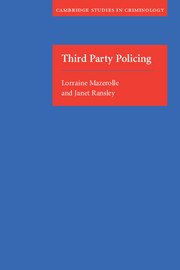Book contents
- Frontmatter
- Contents
- List of tables
- Acknowledgments
- 1 Governance, risk and crime control
- 2 Policing and the new regulatory state
- 3 Dimensions of third party policing
- 4 In the shadow of the law
- 5 Controlling drug problems
- 6 Controlling crime problems
- 7 Equity, side effects and accountability
- 8 Directions for the future
- Notes
- References
- Index
1 - Governance, risk and crime control
Published online by Cambridge University Press: 22 September 2009
- Frontmatter
- Contents
- List of tables
- Acknowledgments
- 1 Governance, risk and crime control
- 2 Policing and the new regulatory state
- 3 Dimensions of third party policing
- 4 In the shadow of the law
- 5 Controlling drug problems
- 6 Controlling crime problems
- 7 Equity, side effects and accountability
- 8 Directions for the future
- Notes
- References
- Index
Summary
A police officer recently told us a story about a “rogue” caravan park. The caravan park was a known problem site with an average of twenty calls being received each month by the police department about disturbances, domestic disputes, drug dealing, car breaks and malicious damage at the park. Police had power under state laws to enter caravans and issue directions to prevent serious nuisances, including a provision that allowed them to exclude offenders from the park for up to twenty-four hours (Police Powers and Responsibilities Act 2000 (Qld) ss368–371), but this was not preventing the problems from recurring. After many frustrating attempts to deal with the problem, the police learned that the manager was in violation of capacity conditions set in a permit from the local council (issued under the Brisbane City Council Local Law Caravan Parks and Relocatable Home Parks 2000), slotting more residents into the park than was allowed. The police created a crime control partnership with the local council as well as with the company that held the caravan park insurance policy. The local council instigated action (for failure to comply with the conditions of the permit, an offence attracting a maximum penalty of up to 50 penalty units or $3750 under s13 of the Local Law, and also leading to possible revocation of the permit, under s19). The insurance company investigated the caravan park and cancelled their insurance because of breach of policy conditions.
- Type
- Chapter
- Information
- Third Party Policing , pp. 1 - 22Publisher: Cambridge University PressPrint publication year: 2006



